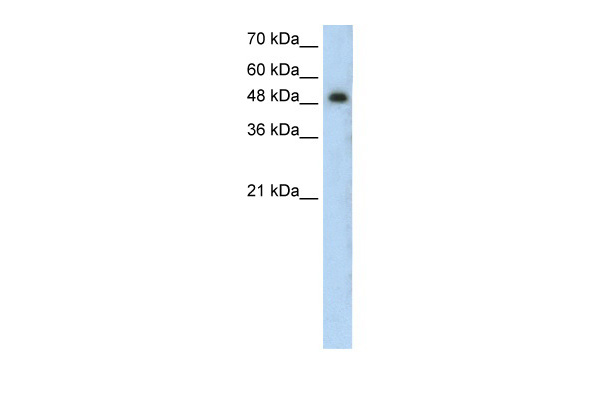PKC zeta (PRKCZ) Rabbit Polyclonal Antibody
Other products for "PRKCZ"
Specifications
| Product Data | |
| Applications | WB |
| Reactivities | Human |
| Host | Rabbit |
| Clonality | Polyclonal |
| Immunogen | The immunogen is a synthetic peptide directed towards the N terminal region of human PRKCZ |
| Specificity | Expected reactivity: Cow, Dog, Guinea Pig, Horse, Human, Mouse, Rabbit, Rat Homology: Cow: 77%; Dog: 75%; Guinea Pig: 75%; Horse: 75%; Human: 100%; Mouse: 92%; Rabbit: 79%; Rat: 92% |
| Formulation | Liquid. Purified antibody supplied in 1x PBS buffer with 0.09% (w/v) sodium azide and 2% sucrose. |
| Concentration | lot specific |
| Purification | Affinity Purified |
| Conjugation | Unconjugated |
| Storage | For short term use, store at 2-8°C up to 1 week. For long term storage, store at -20°C in small aliquots to prevent freeze-thaw cycles. |
| Predicted Protein Size | 45kDa |
| Gene Name | protein kinase C zeta |
| Database Link | |
| Background | Protein kinase C (PKC) zeta is a member of the PKC family of serine/threonine kinases which are involved in a variety of cellular processes such as proliferation, differentiation and secretion. Unlike the classical PKC isoenzymes which are calcium-dependent, PKC zeta exhibits a kinase activity which is independent of calcium and diacylglycerol but not of phosphatidylserine. Furthermore, it is insensitive to typical PKC inhibitors and cannot be activated by phorbol ester. Unlike the classical PKC isoenzymes, it has only a single zinc finger module. These structural and biochemical properties indicate that the zeta subspecies is related to, but distinct from other isoenzymes of PKC.Protein kinase C (PKC) zeta is a member of the PKC family of serine/threonine kinases which are involved in a variety of cellular processes such as proliferation, differentiation and secretion. Unlike the classical PKC isoenzymes which are calcium-dependent, PKC zeta exhibits a kinase activity which is independent of calcium and diacylglycerol but not of phosphatidylserine. Furthermore, it is insensitive to typical PKC inhibitors and cannot be activated by phorbol ester. Unlike the classical PKC isoenzymes, it has only a single zinc finger module. These structural and biochemical properties indicate that the zeta subspecies is related to, but distinct from other isoenzymes of PKC. Alternative splicing results in multiple transcript variants encoding different isoforms. |
| Synonyms | nPKC-zeta; PKC-ZETA; PKC2 |
| Reference Data | |
| Protein Families | Druggable Genome, Protein Kinase |
| Protein Pathways | Chemokine signaling pathway, Endocytosis, Insulin signaling pathway, Tight junction, Type II diabetes mellitus |
Documents
| Product Manuals |
| FAQs |
| SDS |
{0} Product Review(s)
0 Product Review(s)
Submit review
Be the first one to submit a review
Product Citations
*Delivery time may vary from web posted schedule. Occasional delays may occur due to unforeseen
complexities in the preparation of your product. International customers may expect an additional 1-2 weeks
in shipping.






























































































































































































































































 Germany
Germany
 Japan
Japan
 United Kingdom
United Kingdom
 China
China




